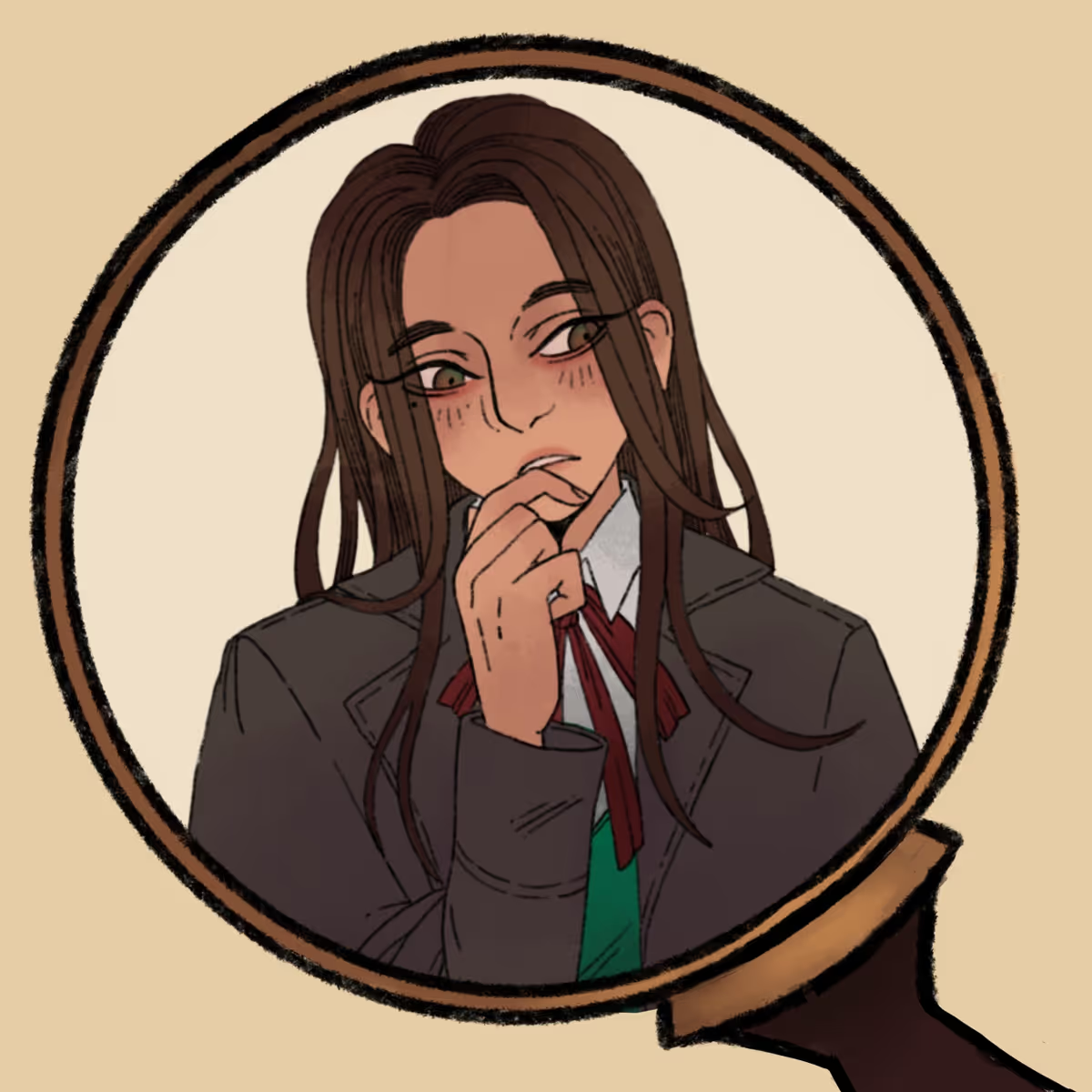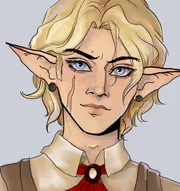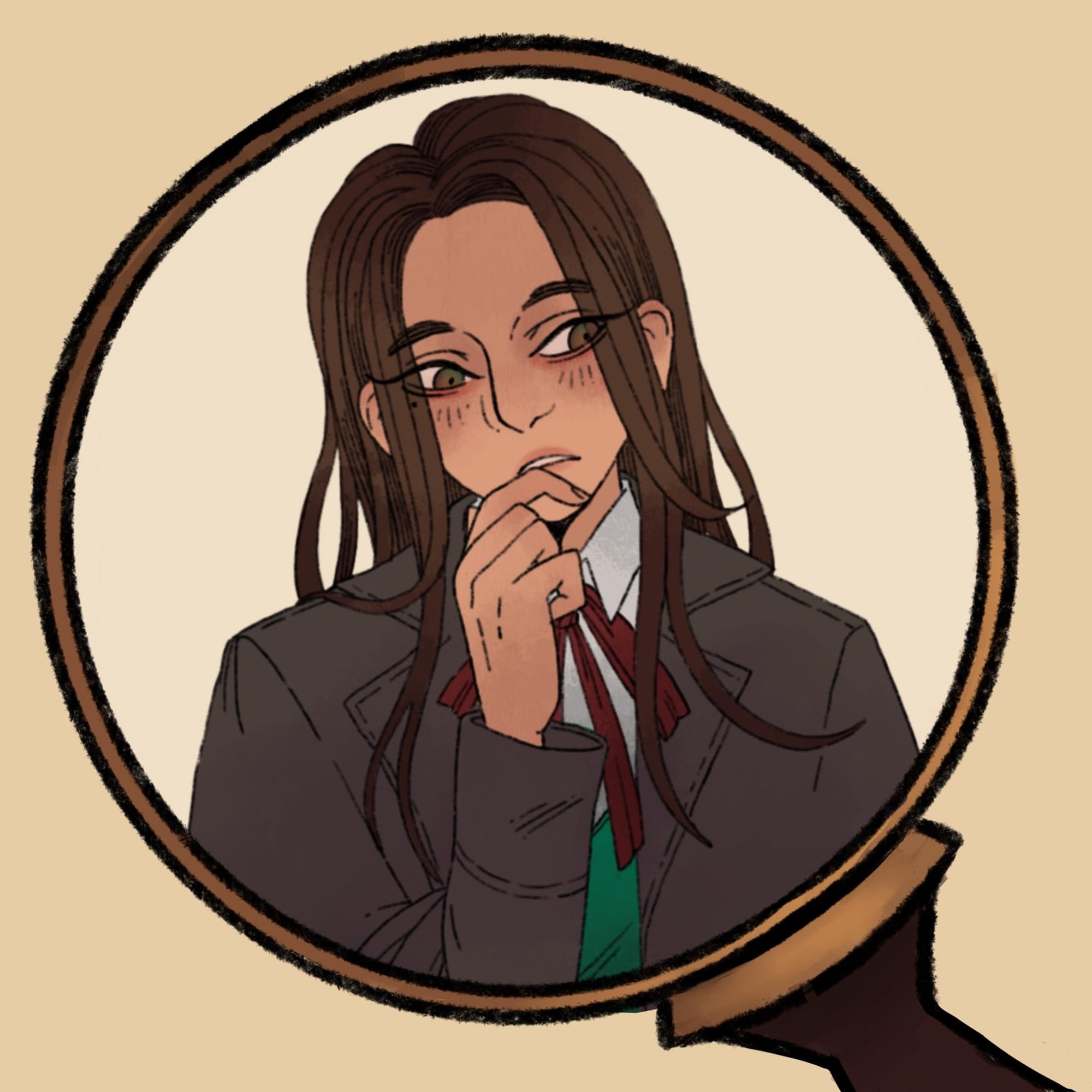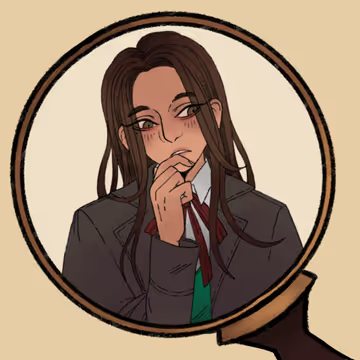The Vanishing Beast: Chapter Seven
The Lord of the House Anghau.

The Case Files of Sheridan Bell #1
Welcome to The Case Files of Sheridan Bell, a fantasy-mystery webseries about an up-and-coming private detective in the city of Tamarley.
Henry paced back and forth in front of fog-bleak windows, exhausted yet bursting with energy. He had an audience: Alice and the Amaikes, seated around the dining table, plates piled high with breakfast foods and mildly concerned looks in their eyes. Henry had burst into the Amaikes’ flat with the tolling of the morning bell, dark bags under his eyes and a stack of heavily bookmarked tomes in his arms. While he paced, he flipped through the oldest of them, his hair falling into his face and his brows furrowed in thought.
“Aha! Here it is. I was up all night reading, following a hunch,” he explained, holding his book up so his friends could see the title: ó Dubhghaill’s Compendium of Intelligent Magical Beasts. “Joseph, Ines, how much has Alice told you about yesterday’s adventures?”
“Enough to get a sense of the situation,” Joseph said.
Henry nodded impatiently, eager to get on to his discoveries. “Yes, good. In summary: dog broke into home, man was killed by dog, and dog vanished, apparently into the aether. We don’t know how the dog got inside, but we know it was strong enough to crush Hathaway’s windpipe—er, sorry, Alice—and that it must have been sídhe, as non-magical threats would have been stopped by Alice’s wards. At first, I thought we might be seeking someone who can change forms, but that theory doesn’t account for certain details. All the clues taken together, I decided to research sídhe fauna.”
“No offense,” Alice said, “But I don’t think some animal could’ve broken through my wards.”
Henry tapped the cover of his book. “Intelligent Magical Beasts, Alice. Any creature in here would be clever enough to outsmart or strong enough to overpower your wards in an instant. Take, for instance, this one.” Without further preamble, he dropped the open book onto the table between a bowl of eggs and a plate of toast. A carefully-inked hound glared up at them all from between the pages, its eyes blank and its teeth bared into a vicious snarl.
Joseph sat forward to read the caption. “The cú sídhe…?”
At that, Alice gasped, and when everyone turned to look at her, shook her head. “The cú sídhe are a folk tale. That’s all.”
“I thought so too, at first, but there are too many stories about them, all told too far apart. That’s never a coincidence,” Henry said. He glanced briefly at Alice, then frowned and looked again. The girl, who had been wearing a plain dress and school jacket the day before, now wore a bright, girlish frock. “You didn’t go home last night to change, did you?”
Alice tugged self-consciously at the lace. “No. Ms. Ines gave this to me.”
“You left her here in a sopping wet dress, Henry,” Ines scolded. “Fortunately, Renna’s old clothes fit her perfectly.”
“Urenna’s style has changed over the years,” Henry said with a smile. He retrieved his book from the table. “It looks very nice, Alice.”
“You know their daughter?” Alice asked.
Henry cleared his throat, cheeks tinged a faint pink. “Getting back to the cú sídhe: in the old stories, they roamed the moors, occasionally crossing to our world—most often on holy nights—to hunt. Their howls foretell death and they can find their prey at any distance, et cetera, et cetera,” he said, picking up another book and leafing through it.
Joseph shifted uncomfortably in his seat. “Is that something to be so glib about, Henry?”
“Nearly every creature in that compendium has the same gloomy story, Joseph. If you read enough of them, they grow tiresome. What I find far more interesting are the kernels of truth hidden behind the myth, the details you see come up again and again in stories from across the continent, across decades or even centuries: that the cú sídhe take the form of large dogs, that they have the power to weave between worlds, that their skill in the hunt is unparalleled.”
“But why would they kill Arthur Hathaway?” Joseph asked. “If these beasts are running around assaulting respectable gentlemen in their own homes, surely someone would have—”
“These are no common wild beasts, Joseph, nor was the attack on Hathaway random,” Henry interrupted.
“Come, Henry, I know you like to save your secrets until the case is solved, but you shouldn’t tease like this,” Ines said.
Henry smiled, amused. “Very well, then. The cú sídhe take orders from their masters, and I found some old accounts that suggest they’re connected to a family here in Tamarley. One of the oldest families in either city, in fact: the Uí Anghau.”
Again, Alice gasped.
“Oh?” Henry asked, raising an eyebrow at her when she didn’t say more. “You don’t believe in the cú sídhe, but you believe in the Uí Anghau?”
“Of course I believe in the Uí Anghau! The Uí Anghau are real!” Alice snapped. “My parents knew someone who made a deal with them.”
“Now you’re both being secretive,” Ines said, crossing her arms. “Who are the Uí Anghau? Why haven’t I ever heard of them?”
“Because they prefer it that way,” Henry said with a shrug, answering the second question first. “From what I can tell, the Uí Anghau keep to themselves. They stay mostly out of the papers, and when they do appear, they’re alluded to but never openly named. The further back you go, the more stories you can find about them, but those are about as dramatized as the cú sídhe’s. They say—”
“The Uí Anghau are deal makers,” Alice interrupted. She glanced at the front door, as if wary the cú sídhe might break it down at any moment. “They’ll give you anything you want, grant any wish, but only at the cost of your soul.”
“Yes, that,” Henry said, unimpressed. “So the stories go, if you make a deal with the Uí Anghau, they send the cú sídhe after you when it comes time to collect. And there is no escaping the cú sídhe.”
“They’re bad news,” Alice said. “They say the Lord of the House Anghau made a deal with death and won.”
Henry rolled his eyes. “You can’t win deals, Alice. The definition of the word implies an exchange. And from what I can tell, they’re not half so frightening as that. They run a respectable business in Upper Tamarley, nowadays. I’m only going to ask them a few questions.”
“Saoirse says they’re not to be messed with.”
“Saoirse’s right, and you’d best listen to her,” Henry said. He gathered up his books. “Now, if you’ll excuse me, I’m off to interrogate their leader.”
“Henry!” Ines exclaimed.
“How are you even so certain the Uí Anghau are involved?” Joseph asked.
“I’m never certain about anything, Joseph. It’s possible they aren’t—it’s also possible they have no connection to the cú sídhe, or that the cú sídhe aren’t involved at all. But I have a theory, and if you don’t mind, I’ll keep this one secret until I’m either proven right or wrong.”
“I don’t like this, Henry. Take your sword with you, if you must go,” Ines said.
“That would be asking for trouble,” Henry said. “Absolutely not.”
“Then take Inspector Zhou?” Joseph suggested.
Henry shook his head. “He doesn’t know about my weaving, and I would prefer that he didn’t find out. If my theory is correct, we only have until tonight to solve this, so I’m certainly not about to waste time going through Customs with the dear inspector.”
“What happens tonight?”
Henry tugged his coat on impatiently and threw the door open. “The beast strikes again.”
Same as the day before, Henry wandered through Tamarley until he came upon one of those strange and subtle distortions that were, by now, so familiar to him. They were easiest to find on days like these, when the changing of seasons thinned the veil between the worlds and magic sparked in the air like static before a shock.
This time, Henry’s clues came in the form of trailing vines and the distant song of a lively fiddle. He followed both to the other Tamarley, to a crowded and colorful square full of music and food and festivity. While the human city celebrated their saints, the sídhe spent the same weekend partaking in much older traditions: the Feast of the Hares, a time to rejoice in the start of spring and celebrate the return of warmth and life, of longer days and budding sprouts.
Henry slipped unnoticed through festival crowds, heading in the general direction of the House Anghau. For all his research, he hadn’t found an address, so he had to stop and ask directions from locals until someone pointed the way with a pitying look. Trying not to think of the implications of that, Henry continued on until the streets quieted around him, storefronts dark and sidewalks empty. Belatedly, he realized that even if he found his destination, it might not be open due to the holiday.
The House of the Uí Anghau, when he did finally come upon it, was not what he had expected. Elegant and understated, with marble carvings along the upper facade, it reminded Henry of a bank and sat between a boutique and an old municipal building, no more out of place than a bank would have been. Despite not believing the stories of the Uí Anghau, Henry had—at least subconsciously—expected something more ominous. As he climbed the steps, though, he craned his neck to study the marble carvings. Amidst filigree and bold columns, there were five figures in hooded cloaks, each with massive hounds stationed at their sides. The largest figure, the one in the middle, carried something that looked like a scythe.
For the first time since taking Saoirse’s case, Henry hesitated. And selfishly, for a moment, he hoped they would be closed. But he tried the door, all the same: it opened easily, and Henry stepped into an utterly unremarkable waiting room. He stilled on the threshold and blinked. If it weren’t for the carvings outside, he would have wondered whether he really had walked into a bank.
The decor, much like the building itself, was simple but elegant; Henry wagered that any one of the plush armchairs and fancy sofas cost more than all the items in his flat combined. At the back of the long room sat a welcome desk, a pair of receptionists stationed behind it, and behind them hung rows of portraits. Only one other person waited in the velvet seats, a man who looked churlishly away when Henry met his eye. As Henry approached the far desk, he noticed a cloying scent in the air, likely from the vases of white roses spaced throughout the room.
“Good morning, sir,” one of the receptionists greeted. “Do you have an appointment?”
“Hello,” Henry said awkwardly, sheepishly, unsettled by the normalcy of the whole situation. “I’m sorry, I didn’t know I needed one. I just have some questions—I’ve been considering doing business with the House and have had trouble learning how it all works. Could you tell me more of the particulars?”
“Of course,” the receptionist said. “That’s a common question we get, here. One of our negotiators can walk you through the process in a complimentary consultation; you’ll be under no obligation to make any deals, afterward.”
Henry bit his lip. Despite how flippant he’d been with Ines and Joseph, he knew it would be foolish to tangle too deeply with the Uí Anghau. But he had little choice. “Yes, very well. Thank you.”
The receptionist passed him a clipboard and a pen. “Please fill out this form. It will need to be reviewed by ard Tigerna Anghau, the Lord of the House, before we can match you up with a negotiator.”
Henry skimmed the intake form with raised eyebrows. Most of the fields seemed innocent enough, if a bit invasive: name, education, occupation, income. He wrote down Henry instead of his professional moniker. “Sheridan Bell” had appeared in more than a few newspapers recently, and while Henry doubted the name meant anything to the most powerful family in Tamarley, he wouldn’t risk being recognized. He carefully kept the word detective off the form, as well, instead listing himself as a “freelance consultant.”
Only two fields at the bottom gave him pause: one asking for a summary of his assets, current and anticipated, the other asking what he hoped to get from the Uí Anghau. He ended up scribbling the word “information” in the latter field before passing the form back to the receptionist, hoping the vague answer didn’t get him in trouble.
“Thank you, Mr. Bell. This review usually takes several days, but Lord Anghau happens to be in the office today. I’ll see if he can get your paperwork approved so we can match you with a negotiator.”
The receptionist disappeared through a door to his right, and Henry glimpsed a plain hallway beyond before it could swing shut again. Still leaning against the reception desk, he turned his attention to the wall of portraits behind the remaining receptionist.
“Are these the previous Lords of the House?” he asked.
The receptionist glanced back at the wall. “Yes, dating back to the first, Lord Tomaltach Anghau.” She shot Henry a conspiratorial look and Henry leaned in, interested. “They say he made a deal with death, and that’s where the family gets their magic.”
Henry tipped his head to one side, curious. “They say the same thing about the current Lord, too, don’t they? That he dealt with death?”
The receptionist nodded excitedly. “They do. If you’re lucky enough to catch a glimpse of him today, you’ll see why. They share a family resemblance,” she hinted, nodding back at the portrait of Tomaltach Anghau.
Henry studied the wall with renewed interest. The lords all shared similar features, their smiles and stares delicate and arrogant. While most were dark-eyed, dark-haired, and rosy-cheeked, though, the portrait of Tomaltach Anghau stood out. His hair was stark white, his clothing all black, his skin pale as a corpse. The only bit of color to him was in his crimson eyes. Against the bright, saturated background of the painting, Tomaltach looked like a black and white photograph pasted badly in.
Henry leaned over the desk to examine the most recent of them. Of the dozens or so portraits on the wall, it was the only one in black and white, a metal-plated photograph instead of an elegant oil painting. It told him little about the current Lord Anghau: that the man was young and devastatingly handsome. That his hair was light, unlike most of his predecessors’, though he had the same hard eyes and strong jaw as the rest. Something about his smirk bothered Henry, tugged at him. When he tried to examine the familiar pull, it only slipped further away.
“What’s he like?” he asked the receptionist.
“Lord Anghau? Cold. Frightening. A good boss, though, as long as you don’t cross him.”
“How long has he been in the position?”
“I’ve only been here a month, so I’m not certain. Around a decade.” With another conspiratorial look, she added, “They say the previous Lord disappeared under suspicious circumstances.”
Henry raised an eyebrow. “What kind of suspicious circumstances?”
Before the receptionist could answer, the door flew open, slamming against the wall with a bang while the very subject of their conversation stood there in the doorway. Lord Anghau—the leader of the House Anghau, the wealthiest man in Tamarley and alleged master of the cú sídhe—was far prettier than his photograph gave him credit for, his frame broad but his features delicate. That was the first thing Henry noticed. The second, his eyes: the same stark red as Tomaltach Anghau’s. It was clear what the receptionist had meant by “family resemblances.”
The man seemed to be out of breath. He took a moment to collect himself, pushing the locks of silver-white hair that had fallen from his ponytail out of his eyes, then turned a predatory grin on Henry, one that chilled the detective and rooted him in place.
The receptionist jumped to her feet. “Lord Anghau! What are you doing here?”
The sídhe ignored her, instead striding forward, his hand held out to Henry. “Mr. Bell, I presume?”
Too shocked to do anything else, Henry shook the man’s hand. The handshake lingered longer than he would’ve liked, Lord Anghau eye-ing him like he was sizing up a purchase. “I’m pleased to inform you that your application has been approved,” the sídhe said. “The other negotiators are busy at the moment, so I’ll be assisting you myself.”
Given the receptionist’s soft gasp, Henry guessed this wasn’t a common development. Panic gripped him; fear raced down his spine. Was this because of how evasive he’d been on the intake form? Or did Lord Anghau somehow recognize Henry as Detective Sheridan Bell, after all? Did he know why Henry had come?
Lord Anghau was watching him with a pleased little smile, so either way, Henry had no choice but to thank him. The receptionist dropped back into her seat, stunned, but Lord Anghau ignored her and said to Henry, “Follow me, if you will.”
Henry did, stepping around the desk and following mechanically as Lord Anghau led him into the hallway he’d glimpsed earlier. At the same time, the second receptionist turned the corner at the far end, making Henry frown. If he was only reaching them now, did that mean Lord Anghau had hurried here to greet him? To what end?
The receptionist bowed as Lord Anghau stepped up to him, then scrambled to hand over the clipboard with Henry’s intake form when Lord Anghau held a hand out for it. With that, Lord Anghau continued without so much as a thank you, glancing down at the clipboard as he walked, his heeled boots clicking rhythmically against the shining marble floor. Henry followed, felt the receptionist’s eyes on them until they rounded the corner and passed into a wide hall filled with rows of desks. The room was full of House employees busy at work—but not so busy, apparently, that they couldn’t pause to watch their Lord and his guest pass by.
Henry grew more anxious by the minute, but that anxiety spiked when Lord Anghau opened an elevator cage door for Henry with another one of his sharp, charming smiles. Henry stepped inside, trying not to wince when Lord Anghau slid the cage door shut behind them both. The elevator slid into motion without any of the lurches, screeches, or clanking gears Henry was accustomed to. It took a moment for him to realize why: this wasn’t a mechanical elevator, but a magical one. The casual show of powerful magic made his heart pick up in his chest.
He tried to keep his eyes fixed on the ground as the elevator climbed, but when he felt Lord Anghau’s gaze on him, he glanced up only to find the sídhe studiously watching the numbers change on the elevator board. Lord Anghau smiled to himself, as if he’d guessed at Henry’s paranoia and was amused by it.
“Did you come all the way from the other city just to visit us?” he asked, meeting Henry’s stare before Henry could drop his gaze again. Henry blinked, startled out of worrying by the unexpected small talk. Lord Anghau watched closely for his answer, as if it truly mattered to him.
“Yes, I did.”
“That’s a long journey,” Lord Anghau said, “But maybe not so bad for you.”
Henry stilled. He told himself he’d only imagined the way Lord Anghau emphasized the word you, as if he was calling out Henry specifically, because that would be impossible. Only a close handful of people knew about Henry’s weaving. “I was surprised to find you open today. I thought, with the festival…”
Lord Anghau nodded. “We’re always open on holidays. Holidays are when we make some of our best deals,” he said, then adding, “People are at their most desperate.”
With another one of his sly smiles, Lord Anghau opened the elevator door to reveal a single long hallway. Two doors sat on each side with a final door at the very end of the hall. Henry guessed their destination even before Lord Anghau reached that fifth door, a gold-plated plaque on it reading “Ard Tigerna Angau.” Lord Anghau unlocked the door with a simple wave of his hand, and with a flourish, gestured for Henry to enter before him.
Henry did, then froze on the threshold at the sight of the massive hound that waited for him inside.
If you’d like to support the story, the best thing you can do is share it with others. You can also support the author with a one-time tip, or get perks in one of two membership tiers:
$2/month - Receive a behind-the-scenes newsletter that includes character art, exclusive content and updates, writing advice, and more.
$5/month - In addition to the above newsletter, receive chapters one week early.



Discussion